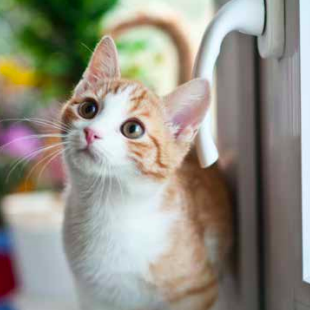
By Steph Selice
Cat people often ask their vets how they can care for their cat’s teeth between checkups. Some of what vets suggest centers on daily actions we can take to help promote and improve dental health in our cats.
Get a vet checkup Including a dental exam
Vets recommend that cats have regular checkups, at least annually, so they can assess your cat’s overall health. Part of any thorough vet exam should include checking your cat’s teeth, gums and mouth. Your vet may have specific suggestions about how to take care of any potential problems or they can recommend specialty care if your cat needs it.
Periodontal disease should be assessed annually. If your cat needs to have dental work done under anesthesia, make sure it includes a complete dental exam with X-rays; a full count of all adult teeth; and a gum disease assessment, including measuring gum recession.
Brushing is key
Many cat lovers find the prospect of cleaning kitty teeth daunting. However, a quick trip to YouTube can help cat lovers learn how to brush their pet’s teeth and check gums, lips and mouth between vet visits. Vets agree that ideally cat teeth should be brushed daily, and if not, at least several times a week. This will help prevent plaque on the teeth from hardening into tartar.
Vets suggest that, before trying to put a brush in your cats’ mouths, you first stroke their whiskers while you then gently lift their lips and touch their teeth and gums briefly, with just a finger. When they’re feeling relaxed, touching their lips and teeth then becomes something your cat can grow accustomed to, as part of being petted by humans they love. Then, the next step, opening the cat’s mouth and getting them used to having a brush touch their teeth, feels less daunting.
When your cat is used to having your fingers in their mouth – playing, not biting – try using some enzymatic toothpaste or other dental product on a brush or gauze. You can also look for changes in your cat’s teeth, gums and mouth, including any broken teeth or tartar buildup. You’ll be more aware of these changes over time, since you’ll be checking your cat’s mouth regularly. Pretty soon, you’ll have your cat at least tolerating having their teeth cleaned, even if they’re an adult kitty.
Vets often recommend using a baby toothbrush, a finger toothbrush, gauze wrapped around a pointer finger or a cotton swab to brush a cat’s teeth. The Veterinary Oral Health Council lists accepted products for cats on its website: VOHC. org. Talk with your vet about what products would work best for your cat’s teeth, gums, and mouth.
Prevent tooth loss and gum disease
Though indoor domestic cats can live long, healthy lives without their teeth, vets emphasize that tooth loss is usually preventable with good dental care. The same is true for periodontal, or gum, disease. Signs of gum disease include bad breath, behavioral changes, loss of appetite and drooling. Advanced gum disease can cause serious health issues for your cat.
VOHC notes on its website: “Excellent oral health is maintained by daily oral hygiene. The gold standard is brushing. Daily chewing activities can also be effective in maintaining oral health.”
Several vets interviewed for this article said that removing an occasional bit of tartar buildup from your cat’s teeth through brushing and other methods is key. They suggested that gently using a moistened cotton swab or gauze to do this will not harm your cat’s gums. But each noted that if there is any doubt about the severity of the tartar buildup or your cat’s reaction to being checked, please leave this to your vet at your cat’s next dental exam.
Cat food, water, and treats
Vets may suggest various types of food and treats for your cat, but not all professionals agree on the best cat food. The VOHC includes a list of recommended dry and canned food and treats on its website.
Many commercial products are available in grocery and pet stores, while some brands require a vet’s prescription. Whatever you and your vet decide is best for your cats, you should always have clean, cool water available. Serve food and water in dishes other than plastic; some cats are allergic to it and can develop a skin condition on their chins. Plastic is also harder than glass, metal or ceramic to keep germ free.
Many cat-food brands help control plaque and tartar buildup. Some cats need special dry or canned food for various health conditions such as kidney disease, urinary care issue or allergies. These brands are prescribed by a vet and ordered online or sold through a vet clinic or pet store. Chewing certain dental chews or treats can also help prevent plaque buildup. Vets often say that an occasional treat helps keep our cats healthy and happy. And that’s the goal, right?
The writer was a volunteer adoption counselor at King Street Cats in Alexandria for seven years.










